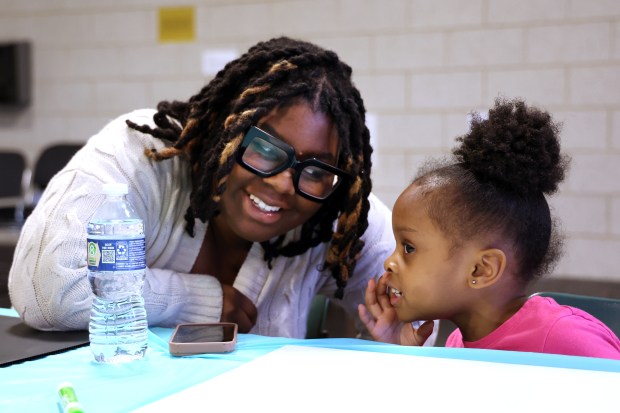When she was a little girl, Ruckiya Ross would read the dictionary for fun. She and her brother would even compete with each other to learn new words. So it’s not surprising to see Ross leading a presentation on phonemic awareness to pre-K children at the Garfield Park Conservatory.
Phonemic awareness is the ability to hear, think about, and work with individual sounds, known as phonemes, the smallest parts of spoken language that combine to form words.
“I had an early understanding that sounds were the key, and from there, I was always an avid reader,” Ross said. “I think I was indoctrinated by (the show) ‘Reading Rainbow.’”
Ross is the founder of Education Couture, a nonprofit centered on making the reading journey fun and cool with music. The endeavor, which began in 2015, has an initiative called Reading Music, in which Ross sings jingles like “CVC” (consonant, vowel, consonant) and “Silent E” — ditties with a pop and hip-hop flare that set and reinforce a foundation of reading skills for primary school students.
The hope is the jingles serve as earworms for children and families who may not have the resources to improve their reading skills outside a classroom setting. Education Couture makes those resources accessible. Ross says the process is designed to meld literacy instruction with musical tracks to mirror the tunes heard on streaming services and the radio. Ross runs the organization with her childhood friend, Executive Director Querida Flores.
The pair run free Family Phonics workshops for caregivers of 3- to 7-year-olds. Kids make a “sound board” poster that supports reading. It highlights long, short and special vowel sounds; digraphs such as ea or ng; and the schwa. Once the board is made, Ross leads the room in a 10-minute call-and-response session that she encourages caregivers to repeat at home as a daily activity.
“This is a pre-reading stage,” Ross said. “Phonemic awareness has science behind it saying that it’s one of the greatest indicators of future reading ability because every human brain is wired to understand speech but we have to systematically connect meaning to the written word. Phonemic awareness is easiest to do because our brains process sound so tying the meaning to the sound as early as possible equips youth in a different way … explicitly helping them understand. We’re trying to engage the most disengaged.”
Ross, who lives in the Auburn Gresham neighborhood, recalls learning how to read before the age of 5 with the commercial educational tool “Hooked on Phonics.” Reading has been a mainstay for Ross since her childhood.
Her workshop starts with a reminder of how smart the participants are with the mantra: “Nothing I learn is too hard. Even if it takes a while to figure it out, eventually my brilliant brain will sort it all out.”
Then she breaks down the alphabet into vowels and consonants. Y is a consonant and sometimes a vowel. Ross talks about the schwa, represented by an upside-down lowercase e, which makes the “uh” sound. “The schwa sound doesn’t show itself — you hear it, but you don’t see it,” She said. “We subconsciously add that schwa sound to make a sound louder because if we really said F, can you hear that? So you say ‘F-uh.’”
Ross and Flores, of Beverly, have been conducting these workshops as a vendor for Chicago Public Schools, on Zoom during the pandemic, and in communities of color, doing all they can to incentivize parents to bring their children to a workshop. Ross then sends digital resources to caregivers to continue the learning. Adults go home with folders full of spelling words, sound charts of the most commonly used words in the English language and QR codes that point to Ross’ songs and the reading lessons that Ross emphasized.
By the time the Garfield Park Conservatory program was over, 4-year-old Reagan Rowe was reading words like “cat” and 5-year-old Makalo Jones was recognizing the word “bat” and sharing his story about when he encountered seeing one. His mother, Chardae Jones, drove nearly an hour and a half from Evanston to get to the weekday event after her mother told her about it. She said her son will attend kindergarten in the fall.
“We made it here because at home we’re working on his phonics, letters and sight words,” said Jones, a real estate agent. “We actually have been going to Sylvan too. I have him enrolled in tutoring one day a week, and they’ve been practicing the basics with him.”
All of these efforts are to make sure Makalo is literate and reading at grade level when he begins his formal education, Jones said. The thing that really stuck with Jones is the schwa, or what Ross calls the “secret sound.”
Ross’ enthusiasm for reading shows in her actions. The petite educator practically buzzes when singing songs for the children — an act that she says she feels more comfortable with than talking to complete strangers. It’s like watching a cheerleader if reading was a professional sports team. She hopes the supplemental educational tools reinforce kids’ literacy chops in a way that brings “learning into fashion.” Hence the name Education Couture.
Ross said Education Couture’s work in classrooms has yielded notable outcomes, with some participating schools ranking in the 70th percentile or higher for students exceeding the reading standard. She is thankful to the IMC Foundation for its support of Education Couture’s school pilot. The program aims to foster a love for reading at an early age, setting the stage for long-term academic success.
“When I’m singing for the kiddies, they give you energy,” she said. “Literacy is the passport to everything. I want them to love reading, to love learning, love reading as much as I do.”
Education Couture welcomes requests for presentations and will conduct the next Family Phonics Maker’s Lab on Saturday at the UIC Neighborhood Center, 839 West 79th St., Suite 312. The event is free but registration is required.




